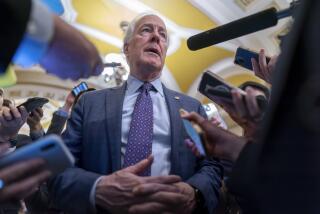Senate breaks impasse, clearing way for vote on Loretta Lynch nomination
For more than five months, Loretta Lynch, the U.S. attorney in Brooklyn, N.Y., has been waiting for Senate confirmation to start work as the first African American woman to serve as the nation’s top law enforcement officer.
On Tuesday, after senators broke a logjam in an unrelated dispute over abortion that had stalled her nomination, it appeared Lynch would soon be able to move to Washington and take over as the next attorney general.
At least 51 out of 100 senators have pledged to support her in a vote that Senate aides now say is likely by Thursday.
Senate Majority Leader Mitch McConnell (R-Ky.) announced a bipartisan agreement Tuesday that ended a political struggle over a bill to fight sex trafficking. He had previously insisted that the issue be resolved before Lynch could get a vote.
“As soon as we finish the trafficking bill, as I’ve indicated for some time now, we’ll move to the president’s nominee for attorney general — hopefully in the next day or so,” McConnell said in announcing the agreement.
The trafficking bill stalled over Democrats’ objections to a provision they said would expand abortion restrictions for victims of the sex trade.
The compromise, forged by Sens. John Cornyn (R-Texas) and Patty Murray (D-Wash.), allowed both sides to save face so the bill, and Lynch’s confirmation, could advance.
“I’m thrilled we were finally able to come together to break the impasse over this vital legislation, and I look forward to swift passage in the Senate so we can ensure victims of human trafficking receive the resources they need to restore their lives,” said Cornyn, a member of the Republican leadership.
Under the compromise, senators agreed that none of the restitution money paid into a victims’ fund by those convicted of human trafficking would be used for healthcare services, averting a broader debate over whether the bill was expanding abortion restrictions.
Instead, health services will be provided to victims with separate government funds that are already subject to limits on abortions except in cases of rape, incest or a threat on the life of the mother, as outlined under the so-called Hyde amendment that covers federal abortion policy.
Though Republicans had come under fire for linking the trafficking bill to Lynch’s confirmation, McConnell defended his decision in a meeting with reporters Tuesday.
“I’m happy with where we are,” McConnell said. “We needed to finish the trafficking bill. It was an important bill.”
tim.phelps@latimes.com
lisa.mascaro@latimes.com
More to Read
Get the L.A. Times Politics newsletter
Deeply reported insights into legislation, politics and policy from Sacramento, Washington and beyond. In your inbox three times per week.
You may occasionally receive promotional content from the Los Angeles Times.








